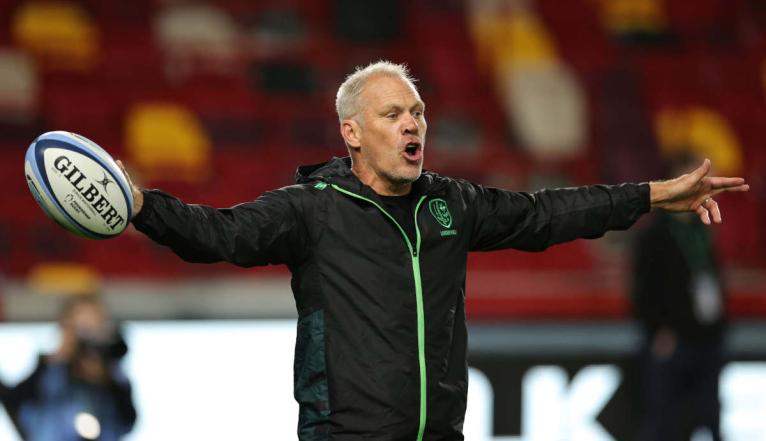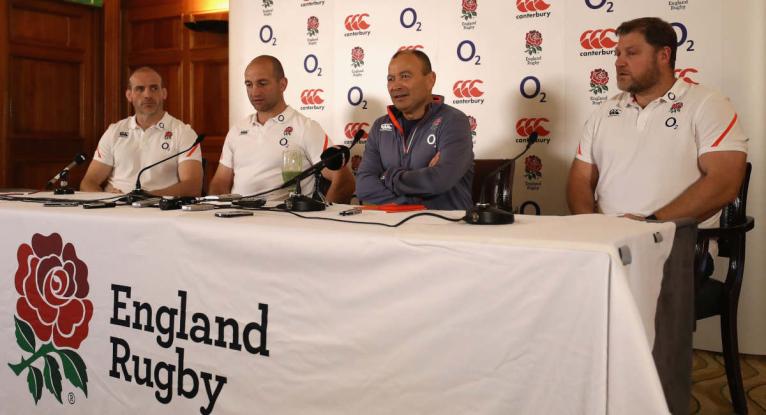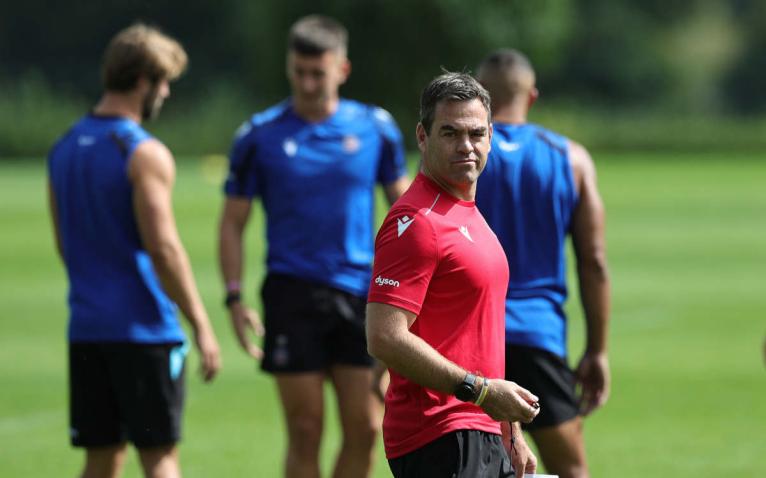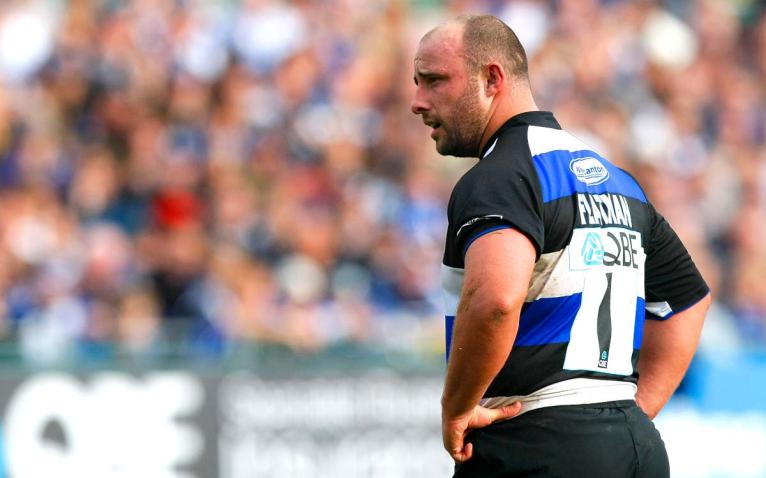Eddie Jones is seeking to reboot Australian rugby. And the operating system that is going to propel this rewired Wallaby machine is starting to flicker into life from a perhaps unexpected power source.
Jones is a man used to shaking things up; of speaking from the hip in order to keep people on their toes; of taking a team from cruising analogue into hyper-speed digital. In a chapter of his autobiography called, appropriately enough, ‘Rebooting England’ he wrote: “Some players don’t want to change. But the best players are curious and have the courage to improve.” Based on last year’s results, Australia need to improve faster than a Quade Cooper sidestep if they are to be in with a shout at the World Cup. But is Jones himself following his own advice of having the courage to change?
There are signals that this is so. And the signals have their roots in the English Premiership and Northern Hemisphere rugby more generally.
When, in May, Jones confirmed his coaching team for the impending Rugby Championship and World Cup, the final piece in the backroom puzzle was the selection of Brad Davis as attack coach. Eddie the maverick had struck again, making a left-of-field pick that few had seen coming.
The surprise at Davis’s selection is, at least on first consideration, understandable. Firstly, Davis has made his mark in the UK as a defence coach, not in attack. Yet Jones now wants Davis to work with him to mastermind a rapid turnaround of the Wallabies’ attacking prowess just weeks out from a World Cup.
Secondly, despite being an Aussie right down to his chirpy demeanour and candid conversation, Davis has based himself in the UK for the past three decades and is – until now – relatively little-known in his homeland. There had been speculation that his fellow Australian and fellow London Irish coach, Les Kiss, would be a more plausible and high-profile candidate as the country’s attack coach.

In early May, London Irish stated that Davis would be “seconded” to Australia until the end of the World Cup. That secondment has now been overtaken by events, with the Exiles having become the latest English side to succumb to the Premiership’s financial meltdown. The door, potentially, is open for Davis to strike a longer-term deal with the Wallabies should things go well over the next few months.
But why has Jones turned to Davis – and the English Premiership – in the first place?
When Jones unveiled Davis as his attack coach, he declared he was on a mission to mount a “smash-and-grab” campaign for the Webb-Ellis trophy. Looking through the team of coaches that Jones has assembled, it seems that a key component of that smash-and-grab is to utilise Northern Hemisphere know-how, both to neutralise the dangers posed by sides from the North, and to prepare his side for a World Cup that is being held there. Davis is just the latest in a number of coaching signings by Jones that have been completed with those ends in mind.
Midway through the English Premiership season, Jones announced that Neal Hatley, the Bath forwards coach and a former England scrum coach, would be schooling the Wallabies’ pack. As with Davis, Hatley is a coach who is steeped in European club rugby, and who knows the English game’s quirks, strengths and weaknesses inside out.
What Jones has done by signing Davis and Hatley is to ensure that his coaching team has a globalist cunning and insight to it. But it is more than that. He has also appointed two men who are the perfect foil to his own well-documented – and often-criticised – idiosyncratically challenging coaching style.
Jones’s man-management can be direct and unsettling. Uncomfortable. Davis and Hatley’s approach is very different. If Jones plays the role of the stern patriarch, the attack and forwards coaches will play the role of the caring older brothers.
David Flatman, the former Bath, Saracens and England prop, knows both Hatley and Davis, and in both cases highlights their sensitivity in responding to individual players’ needs.
Brad had a great knowledge, but really worked at how people best absorbed information. I needed a whisper in my ear with one thing, maybe two, and then have it repeated on matchday. It made a massive difference to the way I played.
David Flatman
“I love Brad,” says Flatman, who played at Bath when Davis was defence and skills coach at the West Country club. “He took time to get to know the people he was coaching and how they absorb information.
“Brad had a great knowledge, but really worked at how people best absorbed information. I needed a whisper in my ear with one thing, maybe two, and then have it repeated on matchday, and it made a massive difference to the way I played.”
Davis was always a livewire defence and skills coach when at Bath, one of those coaches who you sensed would not only be willing to pull on his boots if an injury crisis struck the playing squad, but who quite possibly secretly yearned for it.
Despite being coached defence by Davis, Flatman believes the switch from defence guru to attack maestro is do-able for the former rugby league player.

“If you can coach defence then you know what breaks down defences,” argues Flatman. “Brad’s a very good signing.
“I’ll put my tin hat on here, but I’m a firm believer that when it comes to defence coaching people think it’s more complicated than it is. The systems are largely the same or similar. You’re either getting off the line and eating up the space, or being a bit more passive and drifting. It’s also about making good decisions at breakdowns: when to bite and when not to.”
Flatman played and toured with Hatley, and as with Davis recognises nurturing qualities that he thinks will serve Jones and Australia well.
“Hats is a good bloke, and while he’s not been signed because he’s a good bloke, he has a reputation for giving a lot of time to his players. He can make an impact.
“I’ve seen players emerge much better scrummagers having been coached by Hats. He did a lot with Max Lahiff and with Henry Thomas at Bath. They were already really good but left much better than when they arrived.
Brute, grisly bear strength is very difficult to coach – you need to have the raw material to work with. But Australia have some strong scrummagers and Hats can get the best out of them.
David Flatman
“It’s a great endorsement of Hats that Eddie has selected him because he’s worked with him before when they were at England.
“Brute, grisly bear strength is very difficult to coach – you need to have the raw material to work with. But Australia have some strong scrummagers and Hats can get the best out of them.”
One man who has worked more closely with Hatley than anyone over the past year is Johann van Graan, the Bath head of rugby. Van Graan views Hatley’s appointment as the Australia forwards co-ordinator as a masterstroke by Jones. So much so that he regards the Wallabies as plausible dark horses to win in France.
“What a man, I could speak for hours about Hats,” says van Graan, overlooking the pitches at Bath’s Farleigh House training base where Hatley has worked for much of the past decade. “When I was at South Africa he was under Eddie at England: he oversaw a hard, tough pack. The scrummaging was well-coached, there was a lot of pick-and-go detail, and the pack was fit. It was a very tough team, and he was part of the coaching team that took England to the World Cup final in 2019.

“In the time that we’ve worked together, the number one thing about Hats has been the person. That’s so important in coaching. You’re there to serve and to make people better, and he’s certainly done that at Bath during my time with him. He’s been magnificent with our forwards, not only as a coach but as a human being.
“He’s worked with Eddie before and I think that connection is so important. He’s an experienced coach. Australia is a very interesting project and you could call them one of the dark horses for the World Cup because nobody will see them coming. Hats will add a massive amount to Australian rugby.”
It’s a stirring tribute. Indeed, it’s the kind of tribute that you could imagine triggering restless nights for the coaches of other nations.
In what is his second stint in charge of Australia, Jones has taken a truly internationalist approach. Rather than focusing solely on the resources at his disposal in his own backyard in Australia, Jones has assembled a coaching set-up designed to sabotage and unsettle Northern Hemisphere nations, and to deliver something surprising and unpredictable to his Southern Hemisphere rivals.
Australia kick off their Rugby Championship campaign on July 8 against the Springboks at Loftus Versfeld in Pretoria. To say that is a baptism of fire for Jones, Hatley, Davis and co is to put it mildly. It will be a raging incineration, and all at altitude too. But a white-hot baptism will be a necessary step as Jones seeks to prepare his side to win the trans-Tasman Bledisloe Cup, which Australia have not held since 2002. Jones has made winning the annual series a priority; a stop on the way to the smash-and-grab ambitions in Paris.
With former national boss Dave Rennie sacked in January, just eight months out from a World Cup, it’s hardly been an orderly spell of calm, strategic World Cup preparation for Australia.
Hatley and Davis aren’t the only recruits in Jones’s backroom staff to come from north of the equator. Frenchman Pierre-Henry Broncan, who was sacked by French side Castres in February, is maul consultant. Broncan took his side to the French Top 14 final in 2022 and has also coached at Toulouse. As with Hatley’s and Davis’s appointments, Broncan can be seen as an addition to the Wallaby coaching staff that is intended to inject some uncompromising northern hemisphere intel to proceedings.
With former national boss Dave Rennie sacked in January, just eight months out from a World Cup, it’s hardly been an orderly spell of calm, strategic World Cup preparation for Australia. But then so too for England, who sacked Jones in December. And a disjointed, disorderly build-up requires bold, unusual measures, and what Jones has assembled is a coaching team which he thinks can sow disorder in other sides. But what of the window in which it is to be achieved?
Flatman believes Hatley can make an immediate impact on the Australia scrum, and that Hatley’s in-depth knowledge of the England pack is something that may well have held an additional appeal to Jones as he nurses the wounds of his England exit.

“The two areas where you can make a quick change are scrummaging and defence,” claims Flatman. “I remember when Graham Rowntree came to Bath – one 30-minute session and we played so much better the following weekend. Hats can make a change.
“Is Eddie fixated about the first time he plays England? I expect it would be prominent in his mind, although he wouldn’t admit it.”
As for the longevity of Jones’s coaching team, Flatman cautions against a repeat of the revolving door policy that characterised Jones’s tenure as England head coach. If it doesn’t work out for the Wallabies in France, then he advises letting the coaching team have a proper run ahead of the 2027 tournament.
“Eddie isn’t averse to swapping coaching teams a lot. But expecting the new coaches to go in and completely change the way Australia operate and put them on a par with the best teams in the world in just a few months is quite ambitious. But they are good coaches and good men. Like Steve Borthwick at England, let’s see where they are at the next World Cup. As a player, you don’t want a different coach every five minutes. You learn and grow together.”
The reboot of Australian rugby is clearly underway. Whether there is the accompanying time and patience to allow the new system to buffer up into full technicolour, though, remains considerably less clear.


Never write off Australia....they will upset at some point. Eddie can do that - He's not a long term solution though. Maybe just beating England is enough for his ego....
Dave Rennie would have killed for an Aussie pack that included Will Skelton. With Rory Arnold there too, and maybe Angus Bell and Taniela Tupou coming back from injury, and Serevi available, this Aussie team has the cattle and the draw to go all the way in the RWC. Can't wait for Melbourne.
England's an astute rugby nation however the fact remains that they've only won RWC once, Australia shafted Rennie and by extension access to high calibre NZ coaching resource. Eddies good but did OZ really gain more than they lost? I think it was a bad decision. The style of Wallaby rugby is well understood by NZ who play a similar uptempo style. I'd suggest NZ with the former Irish head coach inside the camp is far better placed than Eddie taking coaches that may or may not work well together from club rugby in England into the last minute pressure cooker of RWC. NZ could take RWC, it's very possible as they're through their trough but it would be fair to say the Boks and France are the favourites with NZ and Ireland in the mix. The Wallabies like England simply don't have the time or cattle to pull off three wins in a row against higher ranked squad's with settled coaching nucleus.
Rennie was completely and utterly hopeless, like every second hand kiwi coach that comes to Australia looking for a paycheck with zero loyalty. He dragged us down to 9th but kiwis still think he's great. Of course they do. Strewth.